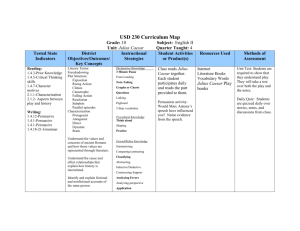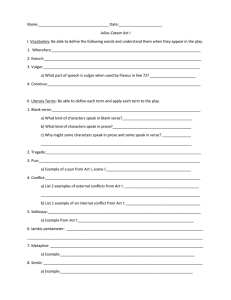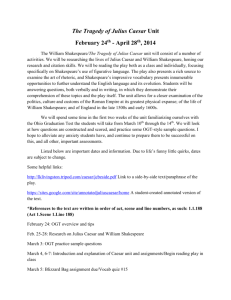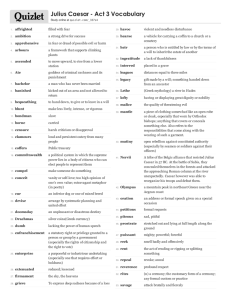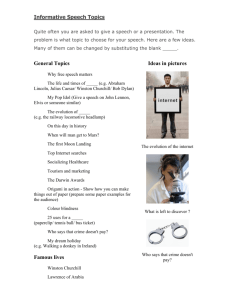The Tragedy of Julius Caesar, Acts I & III
advertisement
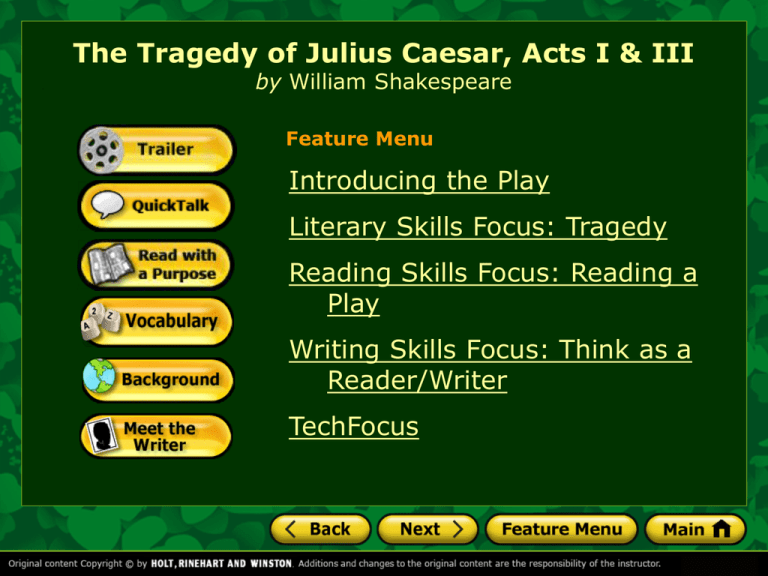
The Tragedy of Julius Caesar, Acts I & III by William Shakespeare Feature Menu Introducing the Play Literary Skills Focus: Tragedy Reading Skills Focus: Reading a Play Writing Skills Focus: Think as a Reader/Writer TechFocus The Tragedy of Julius Caesar, Acts I & III by William Shakespeare What is more important—ambition or honor? The Tragedy of Julius Caesar, Acts I & III by William Shakespeare Click on the title to start the video. The Tragedy of Julius Caesar, Acts I & III Introducing the Play “Power tends to corrupt, and absolute power corrupts absolutely.” John Emerich Edward Dalberg The Tragedy of Julius Caesar, Acts I & III Introducing the Play William Shakespeare’s The Tragedy of Julius Caesar is the story of an assassination. The play • explores the political, psychological, and moral turmoil of the event • contains compelling political parallels to twentieth-century history • reveals how power can corrupt even the seemingly incorruptible [End of Section] The Tragedy of Julius Caesar, Acts I & III Literary Skills Focus: Tragedy Tragedy—a play, novel, or other narrative that depicts serious and important events and ends unhappily for the main character. The main character’s downfall is caused by his or her tragic flaw, or defect in character. The Tragedy of Julius Caesar, Acts I & III Literary Skills Focus: Tragedy Most classic tragedies—such as those of the classical Greeks—deal with serious, universal subjects: right and wrong justice and injustice life and death Tragedies pit human limitations against the larger forces of destiny. The Tragedy of Julius Caesar, Acts I & III Literary Skills Focus: Tragedy The protagonist of most classical tragedies is a tragic hero. This hero • is noble—high born— and in many ways admirable • has a tragic flaw, a defect in character or judgment that leads to a tragic end arrogance greed envy The Tragedy of Julius Caesar, Acts I & III Literary Skills Focus: Tragedy Shakespeare’s tragedies share these characteristics with the tragedies of the classical Greeks: • The main character is often high ranking, not an ordinary person. • The main character’s tragic flaw directly causes a downfall. • The work ends unhappily, with the death of the main character. The Tragedy of Julius Caesar, Acts I & III Literary Skills Focus: Tragedy All of Shakespeare’s tragedies share a similar fivepart structure. Act III Crisis, or turning point Act II Rising action Act I Exposition Act IV Falling action Act V Climax and resolution The Tragedy of Julius Caesar, Acts I & III Literary Skills Focus: Tragedy Act I, Exposition • The main characters and conflicts are introduced. • The setting is established. • Background information is provided. Act III Act II Act I Act IV Act V The Tragedy of Julius Caesar, Acts I & III Literary Skills Focus: Tragedy In Act I . . . Act I ends with the senators intent on crowning Caesar the next day. Cassius calls together his fellow conspirators, and then sets out to visit Brutus to make a last appeal for his assistance in Caesar’s assassination. “He would be crowned. How that might change his nature, there’s the question.” The Tragedy of Julius Caesar, Acts I & III Literary Skills Focus: Tragedy Act II, Rising Action • Suspense builds as a series of complications occur. • The main characters try to resolve their conflicts. Act III Act II Act I Act IV Act V The Tragedy of Julius Caesar, Acts I & III Literary Skills Focus: Tragedy In Act II . . . Cassius persuades Brutus to join the conspiracy but rejects the plan to kill Mark Antony. Caesar is restless after a night that disturbs all of Rome. Calphurnia, Caesar’s wife, persuades him to stay away from the Senate. “When beggars die, there are no comets seen. . . .” The Tragedy of Julius Caesar, Acts I & III Literary Skills Focus: Tragedy In Act II . . . The conspirators goad Caesar into going to the Senate by suggesting that he is weak to give in to his wife’s fears. They report that the Senate will crown him that day. Caesar prepares to accompany the conspirators to the Senate. “And we (like friends) will straightway go together.” The Tragedy of Julius Caesar, Acts I & III Literary Skills Focus: Tragedy In Act II . . . Artemidorus has written a warning of the plot which he hopes to give to Caesar as he walks to the Capitol. Portia, who persuaded her husband Brutus to tell her of the plot, speaks with the soothsayer, who is waiting to warn Caesar of danger. “Tell me your counsels, I will not disclose ‘em.” The Tragedy of Julius Caesar, Acts I & III Literary Skills Focus: Tragedy Act III, Crisis or Turning Point • The main character makes a choice that determines the rest of the play’s action. • In a comedy, the turning point lifts the play upward to a happy ending. In a tragedy, events spiral downward to an unhappy ending. Act III Act II Act I Act IV Act V The Tragedy of Julius Caesar, Acts I & III Literary Skills Focus: Tragedy Act III opens with Caesar on his way to the Capitol. The Tragedy of Julius Caesar, Acts I & III Literary Skills Focus: Tragedy Act IV, Falling Action • The consequences, or results, of actions taken during the turning point are presented. • The main character is propelled deeper and deeper into disaster; the tragic ending seems inevitable. Act III Act II Act I Act IV Act V The Tragedy of Julius Caesar, Acts I & III Literary Skills Focus: Tragedy “How many ages hence shall this our lofty scene be acted over in states unborn and accents yet unknown!” The Tragedy of Julius Caesar, Acts I & III Literary Skills Focus: Tragedy Act V, Climax and Resolution • The climax, or moment of greatest tension, occurs near the end of the play. • In a tragedy, the climax is usually the death of the tragic hero. Act III Act II Act I Act IV Act V The Tragedy of Julius Caesar, Acts I & III Literary Skills Focus: Tragedy Act V, Climax and Resolution • A brief resolution (or denouement) closely follows the climax. Loose ends in the plot are tied up, and the play ends. Act III Act II Act I Act IV Act V [End of Section] The Tragedy of Julius Caesar, Acts I & III Reading Skills Focus: Reading a Play Watching a play is almost effortless. But reading a play requires reading between the lines, as well as reading the lines themselves. The Tragedy of Julius Caesar, Acts I & III Reading Skills Focus: Reading a Play Reading between the lines means using stage directions and dialogue—the characters’ actions and speeches—to make . . . . . . inferences about what each character is really thinking and feeling. The Tragedy of Julius Caesar, Acts I & III Reading Skills Focus: Reading a Play Making inferences involves looking at clues and evidence . . . and then using logic and reason to draw a conclusion about a character’s thoughts and feelings. The Tragedy of Julius Caesar, Acts I & III Reading Skills Focus: Reading a Play Paraphrasing—or restating information in your own words—can also help you understand difficult passages. Reading aloud will give you a better understanding of characters’ relationships. Don’t forget that this play was meant to be performed for an audience. The Tragedy of Julius Caesar, Acts I & III Reading Skills Focus: Reading a Play When you read Shakespeare aloud, read the lines in a scene as if they were written in prose. All of Shakespeare’s plays were written in a verse form called blank verse. Blank verse • mimics the rhythms of English speech • is unrhymed iambic pentameter The Tragedy of Julius Caesar, Acts I & III Reading Skills Focus: Reading a Play In iambic pentameter, each line is built on five iambs. • iamb—unstressed syllable followed by a stressed syllable • pentameter—a line with five feet ˘ evil ′ ˘ that ′ men ˘ do ′ lives ˘ after ′ ˘ them, ′ The ˘ good ′ is ˘ oft ′ interrèd ˘ ′ ˘ with ′ ˘ bones. ′ The their Read these lines aloud, and listen to the rhythm. Which syllables are stressed? The Tragedy of Julius Caesar, Acts I & III Reading Skills Focus: Reading a Play Not all of Shakespeare’s characters speak in blank verse. • Noble characters generally speak in blank verse. • Commoners speak in ordinary prose. • Occasionally a noble character will speak in ordinary prose—when addressing commoners or bantering. The Tragedy of Julius Caesar, Acts I & III Reading Skills Focus: Reading a Play Read the lines below. Which character is the nobleman? Which is the commoner? Marullus. But what trade art thou? Answer me directly. Cobbler. A trade, sir, that, I hope, I may use with a safe conscience, which is indeed, sir, a mender of bad soles. The Tragedy of Julius Caesar, Acts I & III Reading Skills Focus: Reading a Play Into Action: Use a chart to track how characters feel about Caesar and how their loyalties shift. Act and Scene Character For Caesar Act I, Scene I Cobbler and other commoners “make holiday to . . . rejoice in his triumph” Against Caesar [End of Section] The Tragedy of Julius Caesar, Acts I & III Writing Skills Focus: Think as a Reader/Writer Find It in Your Reading As you read, make notes to help you follow the events in the play. The Tragedy of Julius Caesar, Acts I & III TechFocus Imagine you will be filming a scene from the play. As you read, think about where you would place the cameras, whether you would use close-ups, and how you would direct the actors. [End of Section] Vocabulary The Tragedy of Julius Caesar, Acts I & III Vocabulary Archaic Words Some of the words Shakespeare uses are now archaic, which means “having to do with an earlier time.” These words are no longer used today. ague: fever hie: hurry alarum: call to arms, such as knave: servant, or person of a trumpet blast humble birth an: if prithee: pray thee (beg you) betimes: from time to time smatch: small amount fleering: flattering soothsayer: fortune teller The Tragedy of Julius Caesar, Acts I & III Vocabulary Words with Different Meanings The most troublesome words in Shakespeare’s plays are those that are still in use but now have different meanings or connotations. “thou naughty knave” Shakespeare’s day: Naughty means “worthless.” Today: Naughty means “bad.” The Tragedy of Julius Caesar, Acts I & III Vocabulary Words with Different Meanings closet: small room, often a private study just: true exhalations: meteors repair: go gentle: noble. Gentleman once referred to a man who had a title. sad: serious ghastly: ghostly saucy: presumptuous humor: temper or disposition soft: slowly; “wait a minute” indifferently: impartially wit: intelligence [End of Section] The End

